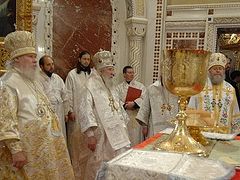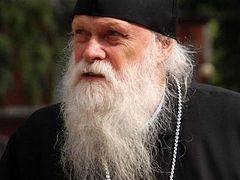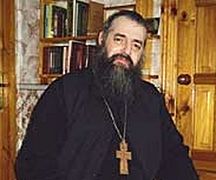The weather has been fickle this spring: sometimes it is snowy with snowstorms, sometimes it is bright with sunshine, like on March 23. I give this exact date because on the following day, March 24, Fr. Vasily (Pasquiet) had his birthday—he turned sixty.
It was on that spring day that we were going to celebrate Fr. Vasily’s birthday. Our minivan was merrily rushing at full speed on the highway that connects Samara and Cheboksary [a port on the River Volga and the capital city of the autonomous republic of Chuvashia in central Russia, situated about 370 miles east of Moscow], where he serves at the Holy Trinity Monastery. He is the father-superior, archimandrite of this monastery, and you won’t find another priest like him across Russia’s vast expanse. The readers may disagree and say that every abbot and father-superior is unique, but our Fr. Vasily is very special nevertheless.
You will agree with me as soon as I reveal his secular name—Pierre Marie Daniel Pasquiet.
In Fr. Vasily’s opinion, it is providential that this year his sixtieth birthday coincided with the feast of the Laudation of the Holy Theotokos, and the sixtieth anniversary since his Baptism coincided with the eve of the feast of Annunciation, just before Pascha.
His parents had their newly-born son placed before an image of the Most Holy Mother of God in the sanctuary.
It was in the small town of Cholet in the Pays de la Loire departement of Western France, formerly the capital of Vendée. It is the coastal region where people have been faithful to God and the traditions of their fathers since the time immemorial. It was here that peasants fought against the revolutionary army and the republicans. Although they were nearly eliminated, those peasants remained unsubdued.
I have felt it necessary to mention this because whatever trials ever befell the young Pierre, later Monk Basile of St. John the Baptist’s Monastery in the desert near Jerusalem in the Holy Land, he always displayed the fortitude and courage inherited from his ancestors.
Services at the Monastery of St. John the Baptist were closely tied to the Eastern Rite, and pilgrims from Russia suggested to Brother Basile more than once that he should become Orthodox. And he thought much about that.
At last the moment came when Monk Basile made his mind to go and serve the Orthodox Church in Russia, which has been a bastion of Orthodoxy since olden times. But for that he had to overcome difficulties that seemed truly insurmountable.
After having suffering much from Russia’s bureaucracy, he was allowed to come to Russia and sent to the Chuvash Republic and his trials intensified. Not only were the residents of that Chuvash village perplexed by the arrival of a French priest, they also displayed open enmity towards him and told him to go away immediately or else he would get a beating. However, another parish met him, a foreigner, more kindly.
And after some time the parishioners accepted him and even came to love him.
Two years’ ministry in the village was followed by more than ten years of ministry in the town of Alatyr in Chuvashia.
It was there that Hieromonk Vasily built a church and gave spiritual guidance to those behind bars, and built another church for them at the prison.
He helped many people find themselves after prison.
Fr. Vasily was leaving Alatyr with tears in his eyes; he had come to love his parish in honor of the Iveron icon of the Mother of God, where life was similar to that of a monastery—with talks, common meals and obediences. They studied together, built the church and the spiritual and educational center together, and lived as one large family.
The residents bade farewell to Fr. Vasily, by that time an honorary citizen of Alatyr, as if he were close family.
Since then he has served as father-superior of the Holy Trinity Monastery in Cheboksary, for about ten years.
I wrote above that our minivan was “merrily rushing” because a festive atmosphere reigned in the passenger compartment.
When I learned that five small children were going to Cheboksary with us I imagined how difficult the journey would be. The children would get tired during the seven-hour journey; they would be acting up and crying. I had experienced this in long-distance coaches so many times!
But I couldn’t retreat and change my plans because I was to bring a film on Fr. Vasily with me, the premiere of which was to take place on the following day, his birthday.
So I armed myself with patience.
But the first three hours passed, and I did not hear children play, cry or complain. I unintentionally observed the behavior of both the adults and children.
And I was travelling with the “characters” of my movie who had decided to live in Russia.
Tau, the liveliest of the boys, would from time to time sneak up on his younger cousin, Paul, and give him a flick on the crown of his head. Paul would turn around, but Tau would squat in order to remain unnoticed.
Paul’s eyes were big and dark brown, they were looking around in alert surprise. At last he noticed the “mischief-maker” Tau, but the latter swiftly ran towards his seat laughing. Tau’s father, Denis, was laughing too because he had seen everything.
Paul had barely calmed down when Tau stole up to his cousin again. But before he could play another trick on Paul, his father quickly gave him a flick on the crown of his head and turned to the window just as if nothing had happened.
Tau was staring at me perplexed, thinking: “Has he really given me a fillip on my head?” A minute later he caught sight of his dad’s cunning smile and rushed to him laughing.
Denis burst out laughing too, lifted his son, seated him on his lap and kissed him.
Tau was trying to tear himself from his dad’s embrace, laughing boisterously, when Paul joined in. While laughing, he threw a rolled candy wrapper in his cousin’s face.
Tau’s mother, Mari, observed the game and caught her son (who had broken away from his dad) as he was running along the coach aisle. Mari clasped her son to her bosom and kissed him.
She was laughing and speaking to him.
First the boy was kicking with his legs and then kissed his mom in return.
I noticed that the parents embraced, kissed their children at almost every movement and smiled all the time. This is how it was with the eldest members of the family, the grandparents Christian and Mari (Fred and Mari the younger are their son and daughter), as well as their daughter and son-in-law, Lucy and Denis.
Our French family consists of twelve members: six adults and six children. Only Lucy was absent because she had given birth to her fourth child three months before. She intended to fly from Paris to Moscow and then go to Cheboksary.
Some of you may think that Fr. Vasily is their relative. Nothing of the kind!
They learned about Fr. Vasily through the internet and contacted him via Skype. They told him that they feared for their children because of the sex education lessons at their schools, which were a nightmare. Each pupil was asked to decide if he or she wished to become a boy or a girl. They were not allowed to call their parents “mom” and “dad”. Instead, children were encouraged to call them “parent no. 1” and “parent no. 2” because their parents could be a “same-sex couple”! And so forth…
Children of dissenting parents are taken to specialized homes and taught to be “persons no. 1” and “persons no. 2”.
Fr. Vasily warned his new friends that it would be very difficult for them to move to Russia.
But his compatriots’ fortitude amazed him. It resembled his own determination when he resolved to live and serve God in the Russian land.
Thus this large French family followed Fr. Vasily’s example. They moved to the Krasny Yar district of the Samara region.
Fr. Vasily visited his new friends and exhorted them to keep connected to the Church, because there they would always find people willing to help them.
And he was right. Fr. Nikolai (Nicholas) Agafonov, a famous priest and writer who lives nearby, helped them, as did the Orthodox Botvinov family, whose son Sergei helped Denis and Mari with the plumbing equipment in their new house.
Sergei is a tall, handsome man. He was travelling to Fr. Vasily’s birthday celebration together with us.
It was the fourth hour of our journey, but the children were neither crying nor complaining to the adults. It was because the adults did not forget them for a single minute.
Mari the junior opened her laptop and found some tales read by one well-known French actor. I don’t remember his surname, but Mari told me that he acted in movies with Lui de Funes. The kids bunched up beside the mom and were listening to the tales. They reacted vividly, laughed and imitated the intonation of the actor who at times read in the threatening voice of villains and at times in the plaintive voice of female characters.
The tales were over, and it was time for the passengers to fortify themselves with food and drink.
So we stopped at a roadside café for a snack. The atmosphere was very friendly and funny again.
 Fr. Vasily’s guests from left to right: Luc, his grandmother Mari, her granddaughter Helene, Tau and Helene’s mother Mari, Denis (Helene and Tau’s father), Fred (Mari the senior and Christian’s son), Christian, and Sergei Botvinov. To the left of Fr. Vasily is Tau, to the right are Paul, Alexei Solonitsin and Oleg Stepanov, Fr. Vasily’s parishioner and longstanding assistant.
Fr. Vasily’s guests from left to right: Luc, his grandmother Mari, her granddaughter Helene, Tau and Helene’s mother Mari, Denis (Helene and Tau’s father), Fred (Mari the senior and Christian’s son), Christian, and Sergei Botvinov. To the left of Fr. Vasily is Tau, to the right are Paul, Alexei Solonitsin and Oleg Stepanov, Fr. Vasily’s parishioner and longstanding assistant. And I thought: why do we so seldom have such an atmosphere in our families? Why do our children invite their mothers’ peremptory cry as soon as they act against their will?
What prevents our parents from playing with their kids? After all, games are the children’s domain.
Why are we annoyed and irritated so often? Why are we often so rude to our kids? Why do we embrace and kiss them so seldom?
Why are we always in a hurry? Why are we so impatient and cold?
Is it hard for us to understand that we can avoid and overcome all conflicts, both minor and major ones, only through love?
Can we do as our French family does?
I say “our” French family because I am sure that everything will be fine with them. They will surely overcome all our trials and tribulations, including Russia’s bureaucracy.
They will withstand any hardships because they love their children.
Because, above all they want their children to grow into good, normal young men and young women. And they want them to be Orthodox. That is why they have come here to Russia.
And what about us? Maybe we criticize our own country too often, calling it “backward”, “uncared for”, “with terrible roads” and so forth?
And we tend to see only its negative sides. But is this the way a mother should be treated?! Do we lose our love for our parents when they get sick?!
While the exhausted children were sleeping, snuggling close to their parents, I remembered the wonderful autobiographical story by the Russian writer Valentin Rasputin (1937-2015), French Lessons. It is about the difficult childhood of a boy in the post-Second World War period. The main character had to move from his native village (which had only a primary school) to a town, a district center. He was forced to play games for money to avoid starvation. Once he won but was beaten by other school-boys; he later won again and managed to buy a glass of milk (he had anemia).
On learning that the boy was in trouble and did not have enough to eat, their compassionate French teacher, in her twenties, tried to help him in every way possible. However, he refused all the food she offered him “out of a sense dignity”. Then she made him play games with her for money and contrived to lose. Now the boy was able to spend his winnings on food… But at the same moment the school headmaster entered and saw them playing, and so the teacher was immediately dismissed. Thereafter the young woman returned to her native region of Kuban in the south of the USSR and sent the boy a parcel of pasta and some apples from there. Earlier the boy had seen apples only in pictures!
The story is excellent, and a good screen version of it was made too.
The lessons that this young French teacher taught us are those of kindness, self-sacrificing love, saving the life of “one of these little ones” (cf. Mt. 10:42), as Christ instructed in His parables.
And I thought: “Maybe this French family is learning Russian lessons in our Samara region today?”
Are we giving our “Russian lessons” properly? Are we displaying love?
Fr. Vasily has shown the effect of “Russian lessons”. And what about others?
I want other people (on whom the future of this wonderful French family largely depends) to follow Fr. Vasily’s example.
Lucy arrived to Cheboksary on time, with her newly-born baby, who they named Batiste (in honor of St. John the Baptist).
But Fr. Vasily was not quite satisfied with it. He decided to baptize the baby in Orthodoxy with the Russian name Alexander.
It was an unforgettable event for all who attended the ceremony.
Once all the necessary prayers were read, Fr. Vasily quickly dunked the boy into the baptismal font.
The baby only had time to open its mouth to cry… And Fr. Vasily dipped it for the second and then for the third time.
After that Alexander’s godfather, Sergei, took the boy in his arms.
He was holding the infant tenderly and gently, giving it a joyous and timid smile.
“A new member of the Orthodox Church has appeared!” Fr. Vasily exclaimed.
Everybody greeted Fr. Vasily on his birthday and after that Fred and Lucy gave a concert at the hall of the spiritual and educational center. It was the main purpose of Lucy’s arrival.
Fred is a musician. He sings, plays the double bass and percussion instruments. Lucy plays the guitar.
The elder son Luc accompanies his parents on snare drums. I think they will have an excellent family musical ensemble in due course.
Maybe one day it will rival the famous U-Piter rock band with its leading soloist Vyacheslav Butusov[1]. By the way, I used a fragment of his love song in my film on Fr. Vasily.
And the people applauded in time with these wonderful words:
We love each other
As if we will never die.
All we need is love!
The Earth is rotating
Because we are walking on it.
All we need is love!
The bright blue of the sky makes me cry,
And the sky is lightening,
Washing with my tears…
All we need is love!
And all those gathered at the hall were applauding, agreeing with these words.
This is precisely what Fr. Vasily spoke about with his spiritual children.
We warmly bade farewell to Fr. Vasily and left…
And Archimandrite Vasily with his brethren remained to pray for all of us.
It is the monastery where he has served as father-superior for almost ten years.
It is here that this pastor has found the path to God and the heavenly abode.
And I believe that his compatriots—the family about which I have written above—will find their spiritual motherland in Russia.









Please pass this along to
orthochristian.com. Do they have an email address?
Thanks !
Jim